This Letter to the Editor ran in this morning’s Guardian (paywall):
As spring arrives and we all spend more time outside, those of us who live in downtown Charlottetown are awakening to a very changed urban landscape, where there are more pedestrians, wheelchairs and bicycles than there are vehicles.
We’re discovering that, suddenly, we have the wrong kind of streetscape for the times: vast swathes of pavement devoted to the absent automobiles, while we all crowd together on the sidewalks and sides of the streets.
And so I have a proposal: during the time of this pandemic, let’s declare the streets of Charlottetown, from Grafton Street to the water, as an “active transportation first” zone. Encourage vehicles, other than those of residents and those making deliveries, to stay out of the area. Lower the speed limit to 20 km/h. And allow wheelchairs, bicycles and pedestrians to freely and safely use the streets, to get the exercise and fresh air that we all need so much.
We have a once in a lifetime opportunity to experiment with what a car-free downtown might look like; let’s take this horrible pandemic and try and leverage the slivers of opportunity it offers us.
I’m hopeful that this will happen in the next week.
From The Guardian, Therapy under lockdown: ‘I’m just as terrified as my patients are’:
For the 35 years I have practised as a psychotherapist, I have discouraged people from seeing themselves as hapless victims of forces arrayed against them. That’s the whole premise – that whatever brought you to my office, it is hampering your ability to direct the course of your own life. So let’s name your pain and then do something about it. Tell off the boss, walk out on the husband, confront the perpetrator, whatever it takes, and then move on, become the agent of your existence.
It’s a profession that has been good to me, and I hope good for my patients. But what if the premise is undone by circumstance? What if it turns out that we are hapless victims of a force arrayed against us, that will mercilessly hijack the machinery of our lives, that is silent and invisible and leaves us with nothing to do but cower in our homes and wash our hands and hope that it will pass us by? Is there a role for therapy in a pandemic?
I love this for its clear-eyed look into the practice of psychotherapy.
A very wise person admitted to me this week, “I’m not sure I want things to go back to the way they were before…”
And I agree.
Here are the things about life-under-COVID-19 that I like and don’t want to give up:
- I talk to my family way, way more often; I think I’ve talked to my mother more in the last month than in the last decade.
- Weekly Learning Seminar every Tuesday.
- I play Crazy 8s with Oliver after supper every night.
- I don’t need an alarm to wake me up: I can get up when I want (which, it turns out, is about the same time as I would wake up with an alarm).
- My Wednesday afternoon trips to the Farmacy to pick up my food order.
- My Friday drop-offs from Receiver Coffee and Purity Dairy.
- I’m much more aware of what’s in the fridge and in the pantry than I’ve ever been, and I treasure every bit of food much more.
- Prince Street is much, much quieter; often there are more bicycles and pedestrians than vehicles.
- No meetings. Well, the occasional Zoom meeting. But, generally, meeting-society is on hold. May it never return.
- No airplanes in the sky.
- I drive my car once a week. Now that summer’s coming, I could easily do without a car entirely. I’ve got nowhere to go!
- Same-day delivery from The Bookmark of books, stationery and pens.
- No tourists. No prospect of tourists.
More so than anything, though, the pace of life has slowed to the point where I can start to see patterns as never before.
I’m as anxious as the next person to have some degree of predictability in my life, for people without jobs to regain them, for people to stop getting sick and dying around the world; at the same time we’ve been granted a unique opportunity to look at how we live and to reconsider it. Let’s not let that opportunity escape us.
A great initiative from Autism Nova Scotia that’s open to autistic people in the four Atlantic provinces. Oliver’s signed up.
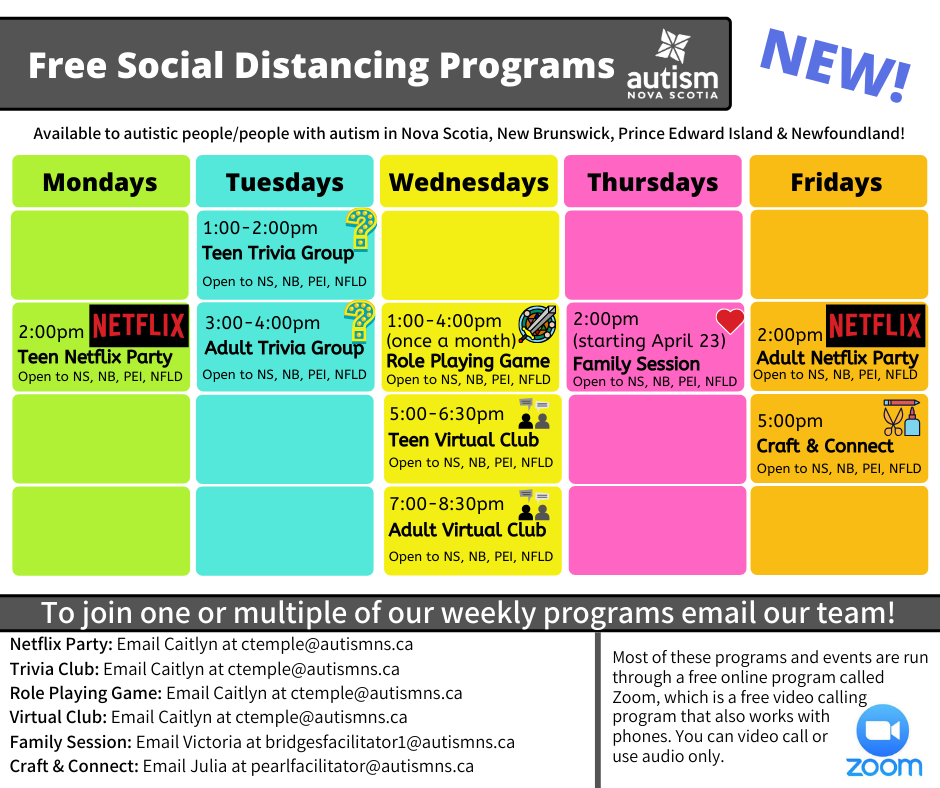
Today’s Weekly Learning Seminar at 100 Prince Street consisted of an attempt to represent the shifting membership of the band Kansas, in its many forms over the years from 1973 to present, in visual form.
From the information we found in Wikipedia, here’s what we ended up with (click the image for a larger version):
It was a good lesson in visualizing relationships, and in understanding that when we think of venerable, unchanged institutions, the reality is often quite different.
Remember traffic light bird?
Well, the traffic lights that were once its home have been disassembled, and the parts for their replacements delivered. Soon the intersection of Prince & Kent will sport shiny new signals.
It appears, though, that the new horizontal poles have sealed ends, meaning that there will be no place for birds to roost. Perhaps not the most egregious habitat loss, but, still, a small change to note in the natural life of the city.
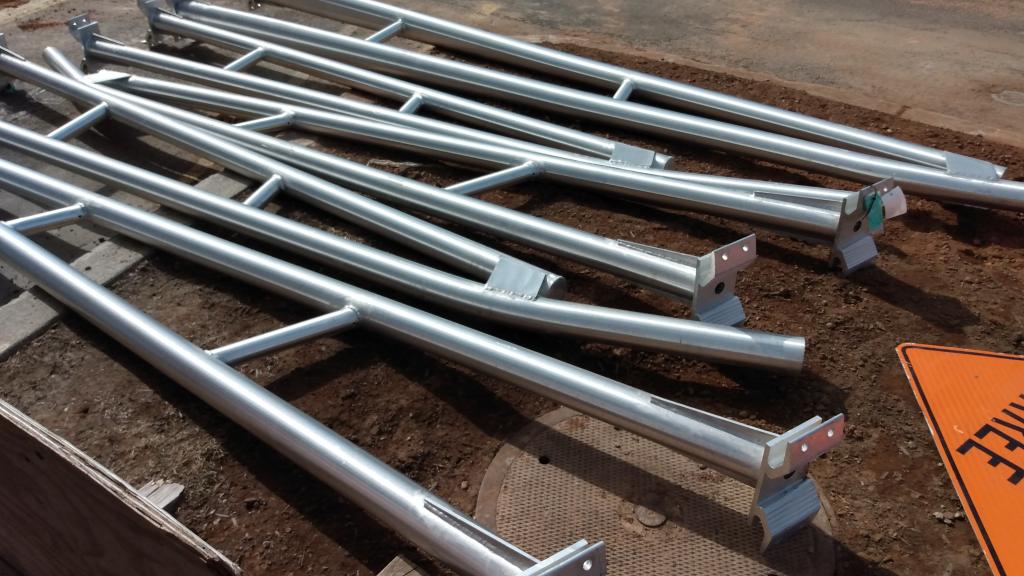
Over the last month, due the pandemic, I have not paid for a single thing with cash, meaning that I have a complete record of all my discretionary spending.
I exported my Mastercard statement, manually added the two Interac transfers I made, and produced this pie chart:
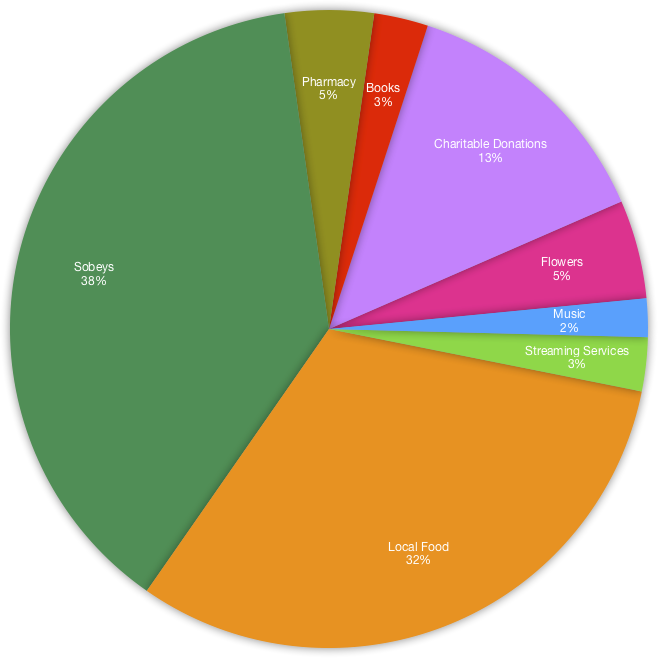
I’m happy to see how much of my spending, 32%, goes to local food–Heartbeet Organics, Receiver Coffee, Gallant’s, Purity Dairy. That’s a big improvement.
I’ve been buying more music directly from artists on Bandcamp, which explains that 2%.
Streaming services are Netflix, Disney+ and Crave right now.
Books came from The Bookmark.
Charitable donations went to Folk on Foot, The Mackenzie Boys, and the Green Party of PEI.
Flowers were from Hearts & Flowers which, yes, is still open and making deliveries.

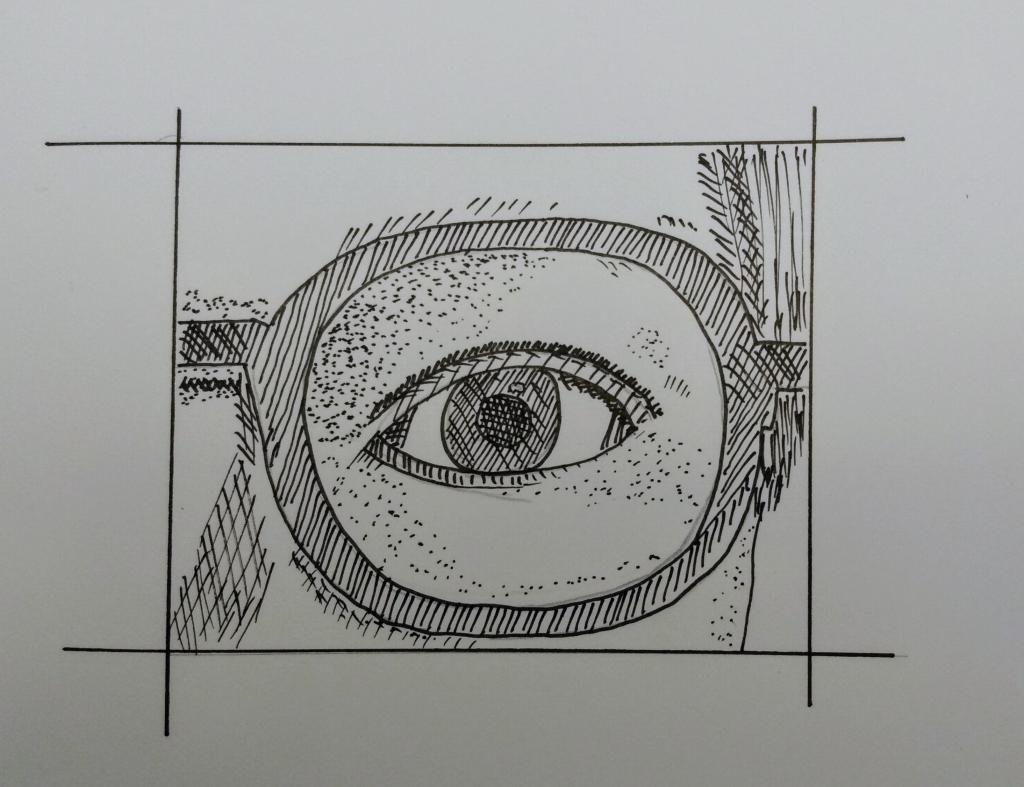
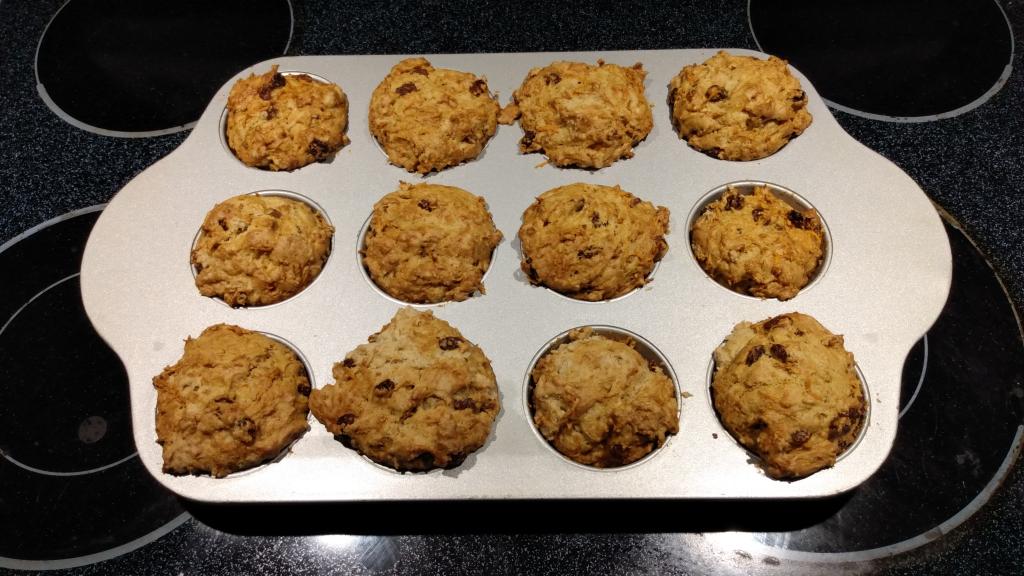
 I am
I am